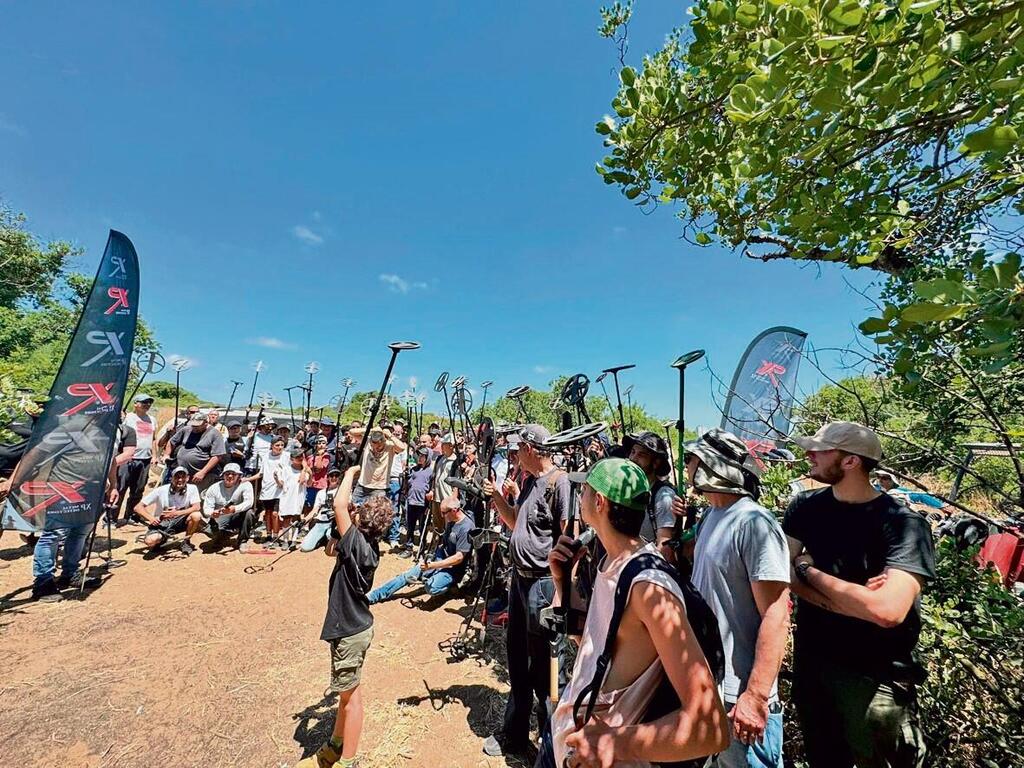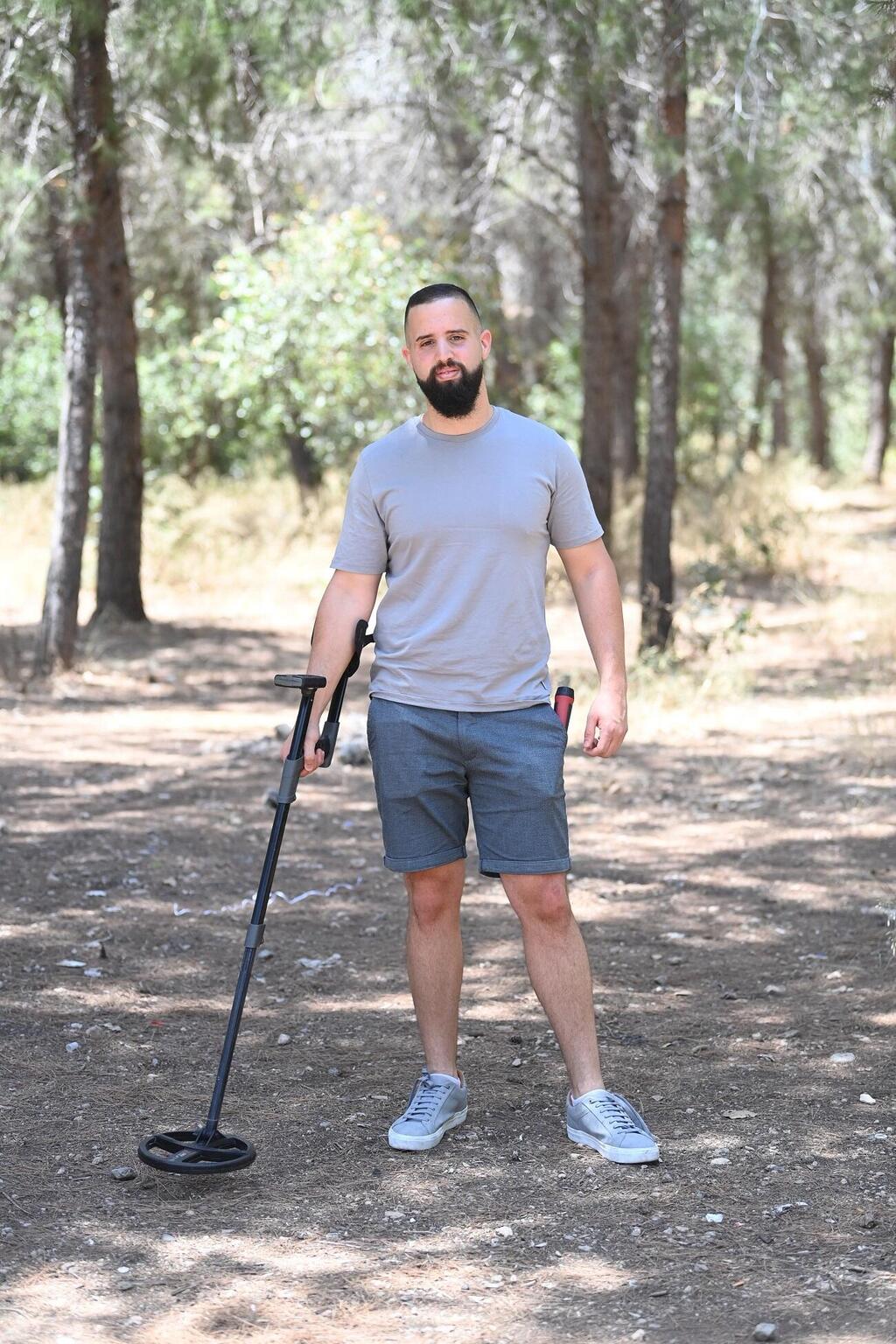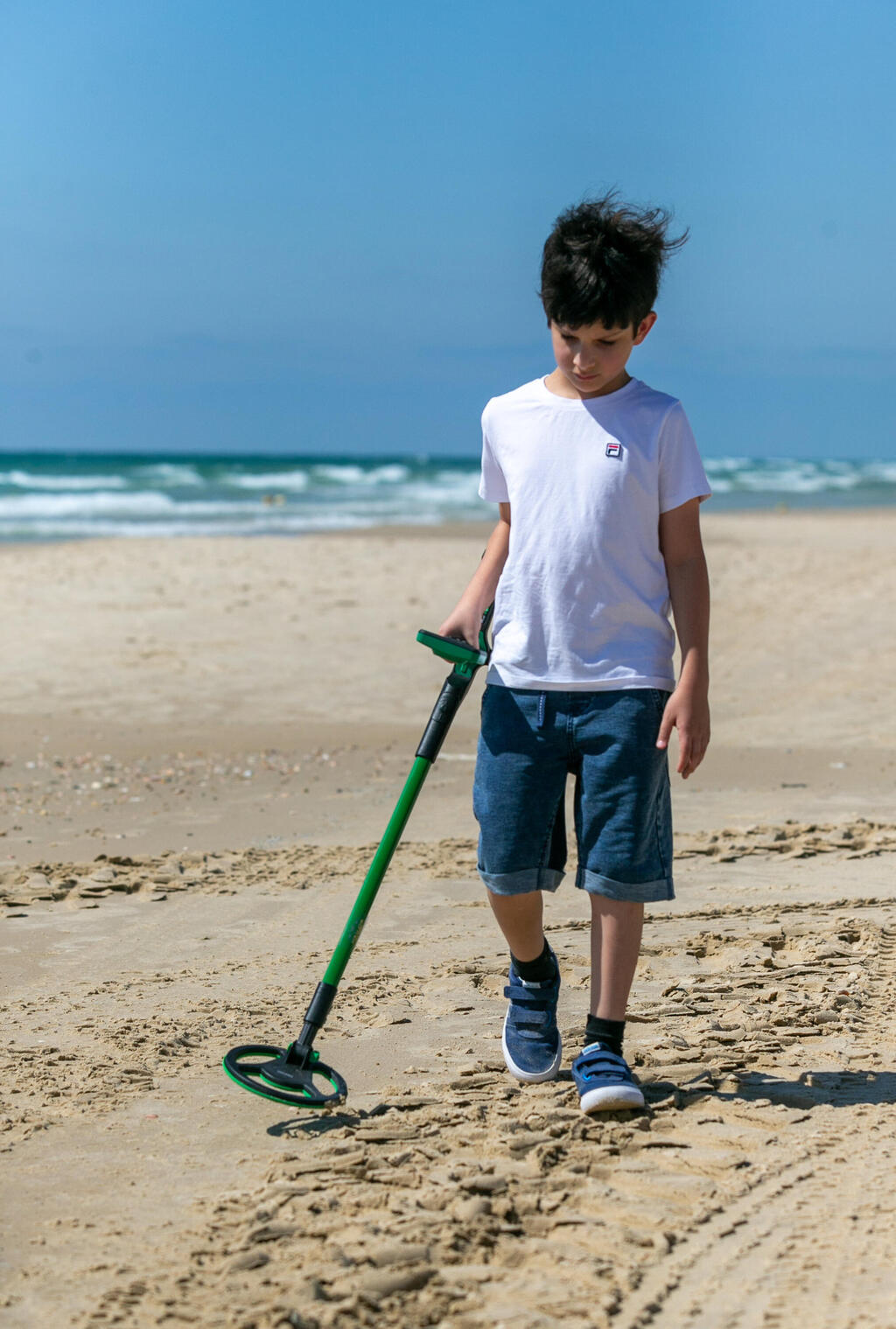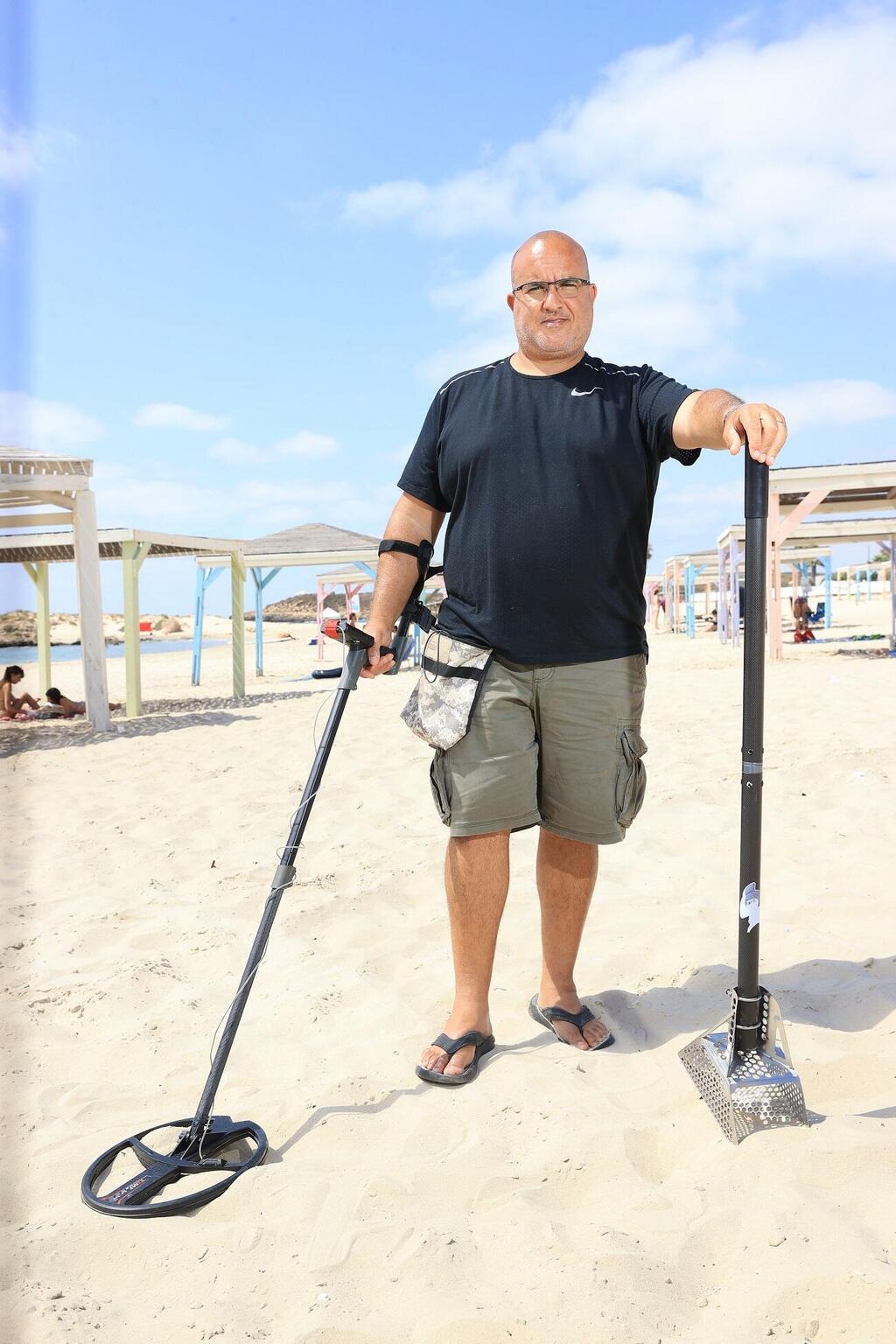Getting your Trinity Audio player ready...
Every summer, millions flock to Israel's beaches, and with them comes a bounty of lost items—ranging from towels and toys to gold rings and valuable jewelry. In recent years, treasure hunters have increasingly taken to the shores, equipped with waterproof metal detectors, to search for these hidden treasures. Many now find gold and silver rings, diamond-encrusted jewelry, ancient coins and other valuable objects. These hobbyists have become a familiar sight on beaches, as common as the ice cream vendors.
What started as a niche interest around a decade ago has blossomed into a full-blown trend. It’s estimated that tens of thousands of Israelis, men and women of all ages, are now involved in treasure hunting. They’ve formed WhatsApp and Facebook groups with thousands of members, sharing videos and photos of their finds and creating a tight-knit community. This trend isn’t limited to Israel—treasure hunting has become popular worldwide.
5 View gallery
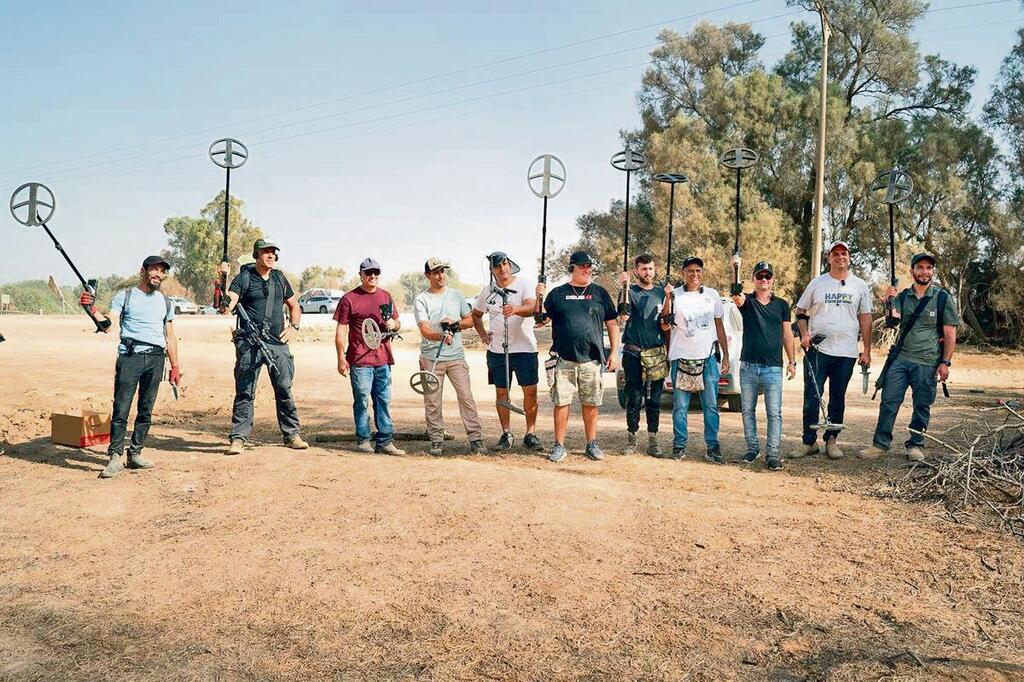

Treasure hunters aid police at site of Nova music festival massacre
(Photo: Eitan Nahum)
While beaches are the main hunting grounds, treasure seekers also search parks, playgrounds, forests and anywhere people might lose something of value. Some even explore archaeological sites for ancient coins and relics, though Israeli law requires any such discoveries to be reported and handed over to the Israel Antiquities Authority. Those unaware of the law or who fail to comply may face fines.
The motivations behind the hobby vary. Some are driven by the thrill of discovery or the hope of profiting from valuable finds, while others enjoy helping people recover lost sentimental items.
For many, the hobby offers a calming escape from daily life and has become an addictive pastime. In fact, amateur metal detector enthusiasts recently assisted the Israeli police unit Lahav 433 in recovering personal items at the Nova music festival site and Kibbutz Be'eri after the October 7 attacks. In another instance, a member posted a video showing the discovery of a discarded gun and two magazines in the sea, which were immediately turned over to the police.
As this growing community continues to hunt for treasures, the search for lost items has evolved from a simple pastime into a nationwide trend with a mix of excitement, relaxation and even public service.
50,000 shekels in one day
"We don't leave the beach until we’ve found at least 3,000 shekels ($800) worth of gold," is the motto among treasure-hunting enthusiasts. Indeed, many search for valuable finds to bring home.
"On a single beach search, including diving, you can come back with treasures worth up to 50,000 shekels ($13,500)– gold, diamonds and even cash," says Daniel Shaulov, 29, from Ashkelon, smiling.
Married with a child, Shaulov has been addicted to this hobby since he was 12. He’s a content creator and co-owner of the content company OTB Content, which he founded with his partner, Noam Feroz, 30, from Netiv HaAsara, who has relocated to Even Yehuda. Feroz, who is also married and a father, shares the same passion for treasure hunting.
According to the duo, it’s a hobby that can be highly profitable if you’re persistent and patient. "Our wives are covered in gold," Shaulov jokes. "They give us the peace and support we need to focus on our hobby."
But it’s not always about the money. "We had an emotional experience when we found an antique pendant, took a picture and posted it on TikTok. The owner saw the video and contacted us immediately. It turned out the pendant was a keepsake from her late grandmother. Of course, we returned it to her, and it was a deeply moving moment."
Feroz adds, "Beyond the thrill of finding gold jewelry, this hobby has a meditative quality. It brings a sense of calm. When I’m searching, I’m fully immersed for hours, disconnected from stressful thoughts, especially after the events of October 7, which I experienced with my family in Netiv HaAsara."
Shaulov even offers a tip. "Recently, we discovered another great spot where you can find treasures without needing sophisticated equipment – in the cracks between the sidewalk tiles at the entrance to the Diamond Exchange in Ramat Gan. We found some insane treasures there, including diamonds and gemstones."
Amit Even, 25, from Modiin, is also hooked on the hobby. He works as a security guard and creates content as well. "Three years ago, I came across a metal detector and its capabilities. I quickly got drawn into the challenge because you always find something. You just need patience. I spend hours searching fields, beaches and forests, and I always come back with treasures. It’s exciting every time.
“I make videos about it and post them online. I already have over 37,000 followers. Once, I found an ancient Roman coin in the Ben Shemen Forest and reported it to the Israel Antiquities Authority, but I’ve also found gold rings and diamonds in agricultural fields, along with many old shell fragments."
The trend isn't limited to adults; in fact, there’s a growing niche of kids who spend much of their free time scanning the ground or sand with metal detectors.
We met 10-year-old Itai Tzatzik from Kfar Saba at Poleg Beach in Netanya with his mother, Hadas. She’s a clinical social worker specializing in addiction, trauma and PTSD. "There’s no doubt that this hobby is incredibly calming," she says. "When I join Itai, I have a specific role: he scans with the detector, and I help dig so he can go deeper. It’s pure fun and quality time with him. I highly recommend it to other parents."
Itai adds, "I got interested in this about a year ago after watching YouTube videos. I was fascinated, so I waited patiently for my birthday, and with the money I received, I bought a kid-friendly metal detector for 850 shekels ($230). Since then, I’ve been inseparable from it.
“Whenever I have free time, I go to the beach or even the neighborhood park to hunt for treasure. I always find something, and it’s so much fun. Now I’m better at it, and I’ve got my parents and brother involved. Lately, I’ve been focusing on special locations, but I’m not giving away any secrets," he says with a wide grin.
Shira, 51, a mother of four from central Israel, is another enthusiast who joined the ground-scanning community. "I heard about the hobby from an acquaintance who suggested I give it a try, saying, 'What have you got to lose? Maybe you’ll come home with some gold!' The rest is history,” she says.
“At first, I didn’t have my own detector and used my friend's, but I quickly bought all the necessary equipment – not just a metal detector but a special bag, accessories for different depths, a digging tool, an elbow brace for the detector, waterproof headphones, a protective cover for the screen and a handheld detector for underwater use. There’s even a kit for cleaning coins. I’ve become quite the professional. And I quickly realized I’m not the only one drawn to the peace this hobby brings. I plug in my headphones, and it’s like I turn into Sherlock Holmes."
Do you remember a particularly moving find?
"The most emotional moment for me was when I helped a newly engaged woman who lost her engagement ring in the sea. She was in tears, explaining that the ring was very precious, and her fiancé had saved up for a long time to buy it. I went into the water and searched relentlessly until I found it. It was such a heartwarming experience.
“This hobby draws a lot of people, and the community is growing all the time. Just three weeks ago, we had a group meetup. We have several WhatsApp groups, and there are countless stories of exciting finds – not to mention the amount of money we come across, sometimes thousands of shekels in a single day."
Detectorist adventures abroad
One of the prominent figures in the metal-detecting community is Eitan Nahum, who, together with his brother Erez, owns Eitan Detectors, a store in Moshav Aviel, near Binyamina. They are Israel’s leading importers of metal detectors and have another branch in Tel Aviv.
"I believe there are at least 30,000 Israelis into this hobby today," says Eitan. "Ten years ago, there were only a few hundred. I started as a hobbyist, looking for gold. It’s a natural desire—everyone has a bit of treasure-hunter in them. After a few years, I got my brother Erez hooked, and we eventually found ourselves, along with others, volunteering to search for personal items and jewelry that might help identify the missing from the Nova Festival.
“We collaborated with the Israel Police’s Lahav 433 unit and searched in Re’im Forest using metal detectors, looking for personal belongings and weapons remnants. It was intense. We found gold jewelry from festival-goers, older pieces of jewelry, burned phones and ammunition. We truly saw hell there.
“Everything was handed over to Lahav 433, which returned items to families. Despite the area having already been thoroughly searched, we still found items belonging to six missing individuals. We even discovered dental fragments, which eventually led to DNA identification of four bodies. We also found handcuffs belonging to a missing police officer.
“After Re’im, we went to Be’eri, to the home of a family whose house had burned down. A family member who knew where the gold had been stored found only one item. Erez, I, and three other volunteers scanned the house and discovered a melted gold ring with a diamond—partially melted, but still intact. We searched for over two weeks with more than 50 volunteers from all over the country who just wanted to help."
How did the metal detector business start?
"I wasn’t the first to sell metal detectors in Israel, but I realized there was potential. I’m a farmer, and when I got hooked on the hobby, I found there weren’t many places to buy equipment. At first, I didn’t even know the laws, and the Israel Antiquities Authority caught me after I found ancient coins, not knowing I had to turn them in. I started researching how to do it properly. The law here is strict—you can face up to 5.5 years in prison for breaking it. No one has actually gone to jail yet, but they impose hefty fines of thousands of shekels, and they confiscate the detector. It’s not a pleasant experience.
“Still, even those who’ve been fined and lost their detector don’t give up. We’re addicted, plain and simple. I spoke to a man on crutches who’s been searching for four years and has found over 60,000 shekels worth of treasure at the beach. People find hundreds of thousands of shekels' worth of gold. They search everywhere—in neighborhoods, parks, playgrounds, soccer fields—anywhere people go. Along the way, we also collect a lot of trash, which makes environmentalists happy. Beaches are especially good for finding jewelry and gold.
"Every year, I fly to Thailand with my detector. A vacation without it isn’t a vacation. Often, what I find covers the cost of the trip. I’ve also been to Dubai several times—the beach there is littered with gold, as you’d imagine. I found a Tiffany ring worth over 10,000 euros and gave it to my wife. There’s no way I would have bought her something like that. Dubai is crazy because almost no one there uses metal detectors. On my last trip, I found a gold ring with a ruby worth 2,500 euros, but then the police showed up. I had to pay a fine and turn over the ring."
“But for most people, it’s not about the expensive jewelry or the money. In Netanya, there’s a group of veterans with PTSD that I support voluntarily—I invite them to search with metal detectors. It helps them disconnect and relax. And it’s not just veterans. I used to be on crutches after an injury. I took up metal detecting, and it helped me get off the crutches. A person can be out searching for five hours or even 18 hours straight. It’s also great exercise—walking, bending, digging and covering miles."
How much do metal detectors cost?
"We’re now the leaders in the field. There’s no innovation I don’t bring to Israel. Garrett, one of the world’s largest manufacturers, invited me to Italy for the launch of a new model so I could give my opinion. I flew there with my son. I travel around the world, visiting the biggest manufacturers and companies. The most popular detectors, which give the best value for money, cost between 7,500 and 8,500 shekels. The best right now is the XP, which costs 8,500 shekels. It’s light, compact and very practical. There are highly professional devices with imaging, software and screens that can cost over 300,000 shekels. For a hobbyist, though, you can get a good detector for 20,000 shekels, including a diving system, bag and all the gear to maximize the experience."
How does Israel compare to the rest of the world in treasure hunting?
"I just got back from an international gathering of enthusiasts in Rome, and I can say that we’re on a global level. There were 300 people there. Honestly, Israel is not lagging behind when it comes to metal detecting. Considering our population size, we’re keeping up with the global trend, and there’s room for more growth.
“I host similar events here in Israel—monthly group meetups, and at least one mega-event each year. The last one drew over 150 people, but it was an especially hot day. The events are free, but for now, they’re only for members of our group. We hold competitions to see who finds the most treasure. The first prize is worth 4,500 shekels, second prize is 1,000 shekels, and the third is equipment worth 350 shekels. It’s all about promoting the hobby and building a community."
Many kids get into it as well.
"I’m a bit of a 'shoemaker with no shoes'—both Erez and I have five kids each, but my kids aren’t that into it. Erez’s son Sahar, though, is fully immersed. We even opened a kids' section in our store. I’m often invited to my kids’ classrooms to talk about the hobby, and I bring examples of treasures I’ve found. It sparks their interest, and some of them rush to buy kid-friendly detectors, sometimes using birthday money.
“During summer vacation, many kids join the searches. When I started, there were no metal detectors for kids. Five years ago, we’d sell two or three a month. Now, we sell four to five a day, and hundreds a month. These detectors cost 850 shekels and can be used up to a meter underwater. They come with a two-year warranty.
“Some parents tell me they saw cheaper ones on AliExpress, and I tell them: go ahead and buy it. In the end, cheap turns out to be expensive. They come back a year later: ‘The detector stopped working ages ago.’ We have a kid in our group who used a child’s detector for four years, then upgraded to a 3,500-shekel one, but eventually returned to his original detector and found several gold rings with it."
Can you share any memorable stories from your years in this field?
"We had a case where a newlywed couple lost a 60,000-shekel wedding ring in the Sea of Galilee. Using a detector that can reach the lake’s depths, we managed to locate the ring. In another case, someone contacted us after losing his Patek Philippe luxury watch, worth $150,000, in the Sea of Galilee. He had hired divers, but they couldn’t find it. In the end, he found it after hours of searching with a metal detector he bought from us—he was ecstatic. There was also a woman from Bnei Tzion who called us three days after losing a ring worth tens of thousands of dollars. She was too afraid to tell her husband. She wanted to rent a detector to search the garbage bins, but by then, it was too late—the trash had already been collected."


